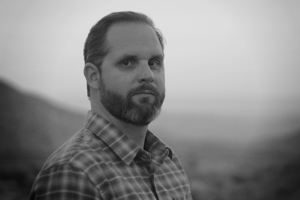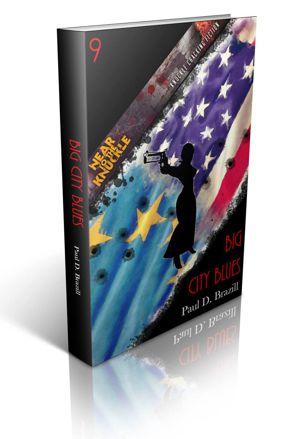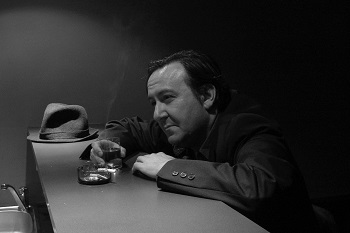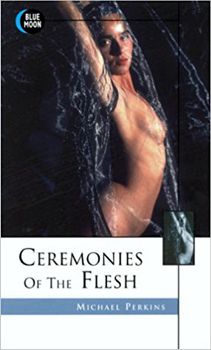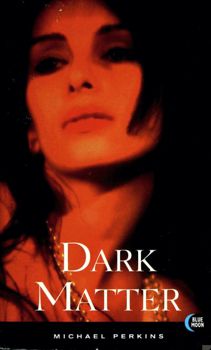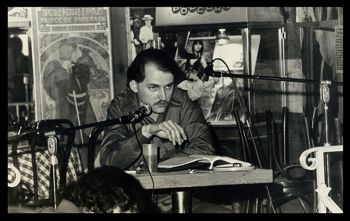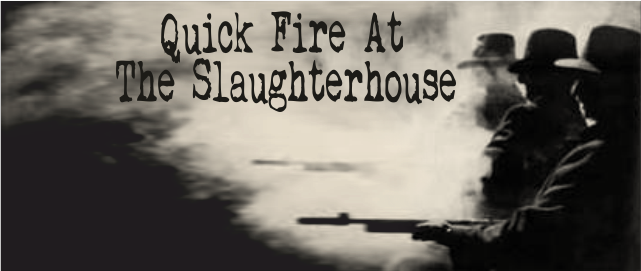
Matt Phillips writes real Noir, the kind of Noir fiction that possesses the spaces inhabited by Jim Thompson and James M Cain, dark places we all inhabit. But while many, among the teeming masses of fawning sycophants and dumb poseurs who shred in onanistic train rides the pages of the glossy magazines that attempt to dictate tastes, in the name of what exactly? the dollar or the pound? fiscal realities are burning by the day, while these citizens of the unfree world profess not to do so, writers expose the hollow lie that haunts the heart of a social vacuum, and it seems that the second law of thermodynamics is alive and well and kicking like a demonic foetus in a womb. His new book is Accidental Outlaws, and he is here at The Slaughterhouse drinking whisky. Oh and before you ask, yes this is all about Artistic Revolution.
Tell us about your latest release
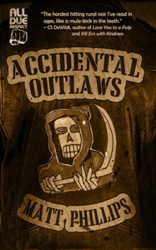 My latest release, Accidental Outlaws, is a book of three rural noir novellas from All Due Respect Books. These are punch-you-in-the gut tales with plenty of desert atmosphere, criminal hijinks, and enough gunfire to make you cover your ears and clench your teeth. Imagine jumping in a hot rod and jamming the throttle down a long desert highway––that’s the book.
My latest release, Accidental Outlaws, is a book of three rural noir novellas from All Due Respect Books. These are punch-you-in-the gut tales with plenty of desert atmosphere, criminal hijinks, and enough gunfire to make you cover your ears and clench your teeth. Imagine jumping in a hot rod and jamming the throttle down a long desert highway––that’s the book.
Should writers also be Revolutionaries?
Great question. In today’s world of bite-sized dialog and armchair activism, writers are revolutionaries. Whether they want to be or not. These days, not a lot of people have the guts and patience to sit down and craft a story. There’s a whole lot of people out there who jump on the latest meme or hashtag, but that doesn’t mean shit when you get down to it. Tweets can be deleted. 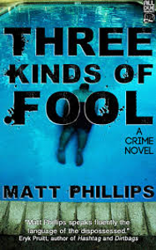 Or ignored. Your Facebook posts are owned by some dude in Silicon Valley. When you write a book and it gets printed? There’s no taking that back. You are what you do every single day. And when you sit your ass at the desk and write a book, you’re a writer. It’s a political statement to write: You’re raising your voice and you’re saying––in fifty, sixty, or seventy thousand words––that you will not be silenced. Should writers be revolutionaries? They’ve got no damn choice––they already are. And always will be.
Or ignored. Your Facebook posts are owned by some dude in Silicon Valley. When you write a book and it gets printed? There’s no taking that back. You are what you do every single day. And when you sit your ass at the desk and write a book, you’re a writer. It’s a political statement to write: You’re raising your voice and you’re saying––in fifty, sixty, or seventy thousand words––that you will not be silenced. Should writers be revolutionaries? They’ve got no damn choice––they already are. And always will be.
What’s ‘wrong’ with extreme sexual content in literature except to those fawning pc eunuchs who don’t get it?
I don’t give two fat steaming shits about extreme sexual content, extreme violence, or anything else ‘extreme’ a writer puts into his or her story. The only thing I care about is whether the 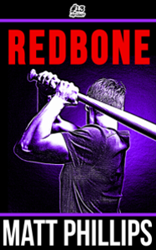 writer does the job: Is the writing persuasive, detailed, and in a voice that must be heard? Is the story worth the telling? Yes? Good. Then tell the damn thing. Write it down. The only people who complain about content in art are the armchair activists. It’s easy to criticize art from a cell phone. And you know what? It’s easy to become a fascist too. Don’t tell me what to put in my stories. I’m sure as shit not going to tell you what to put in yours. You know?
writer does the job: Is the writing persuasive, detailed, and in a voice that must be heard? Is the story worth the telling? Yes? Good. Then tell the damn thing. Write it down. The only people who complain about content in art are the armchair activists. It’s easy to criticize art from a cell phone. And you know what? It’s easy to become a fascist too. Don’t tell me what to put in my stories. I’m sure as shit not going to tell you what to put in yours. You know?
Is Noir the ultimate form of crime fiction and why is the law an ass?
Noir is the ultimate form––here’s why: Noir illuminates society’s dark alleys and hidden passages. It gives us metaphorical territory where we can discover revelations (good and ill) about governments, institutions, private property, and the bad man (and woman) next door. Noir is also about the human capacity to question God’s existence. In Michel 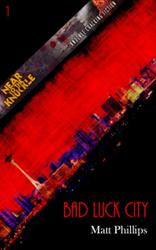 Foucault’s Discipline & Punish, he discusses stories of crime and criminals. We come to see that all this noir and crime fiction is about disparity between people. He says, “This literature of crime…was a locus in which two investments of penal practice met––a sort of battleground around the crime, its punishment and its memory.” That last part is most important…What is our collective memory? The ‘law’ is an ass when it hides the truth, when it tries to damage the memory of a crime, a criminal, or people associated with such. If you’re a lawman and you’re hiding some truth, you’re more than an ass. You’re scum. You know what homicide cops say? Everybody lies. And they’re right.
Foucault’s Discipline & Punish, he discusses stories of crime and criminals. We come to see that all this noir and crime fiction is about disparity between people. He says, “This literature of crime…was a locus in which two investments of penal practice met––a sort of battleground around the crime, its punishment and its memory.” That last part is most important…What is our collective memory? The ‘law’ is an ass when it hides the truth, when it tries to damage the memory of a crime, a criminal, or people associated with such. If you’re a lawman and you’re hiding some truth, you’re more than an ass. You’re scum. You know what homicide cops say? Everybody lies. And they’re right.
Classic interview.
Links:
Buy Accidental Outlaws via the publisher, Down & Out Books or Amazon.com, Amazon.co.uk, Barnes & Noble, Nook, iTunes, Kobo, IndieBound
In the UK, all other of Matt’s books can be found on Amazon.co.uk: Three Kinds of Fool, Redbone, and Bad Luck City
Matt’s books published by All Due Respect , an imprint of Down & Out Books, can be bought via Matt’s Amazon.com author page

